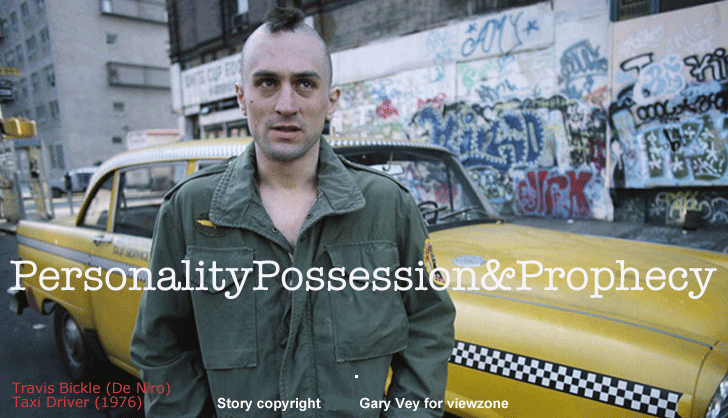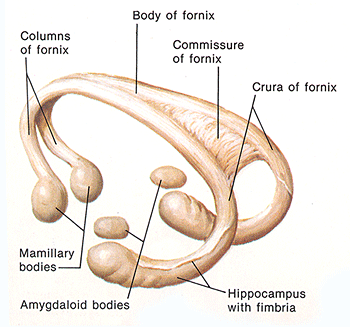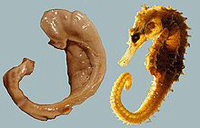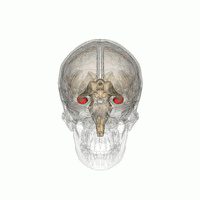
The Fugue of War...
Fugue was a common phenomenon in combat, usually treated by some R&R. But it was later discovered that fugue was sometimes a precursor to Post Traumatic Stress Disorder (PTSD).

Consider the case of a 29-year-old female who experienced the onset of dissociative amnesia [fugue] during an academic trip to China. She was found in a hotel bathroom unconscious, with no signs of structural or neurologic abnormalities or alcohol or chemical consumption. The woman was sent home but could not remember her name, address, family, or any facts about her home life.The amnesia persisted for nearly 10 months, until the feeling of blood on the woman's fingers somehow triggered the recollection of events from the night of onset of her amnesia, and soon to follow were other events and facts of her identity.
The woman finally remembered having witnessed a murder that night in China. She recalled being unable to help the victim out of fear for her own safety -- an extreme emotional conflict unlike anything she had previously experienced. She came to remember other aspects of her life but some memories remain unretrievable. [7]
In other cases involving fugue, a young woman describes wandering around, not knowing who she was or why she was there. Going into an internet cafe, sitting sat down and automatically logging in to her e-mail account. The password came automatically, her fingers just types the correct letters, and she successfully read messages from her family and friends -- begging to hear from her.
"The e-mails were all addressed to this 'Judy' person. All these people were trying to locate her. I had no idea who she was or why her mail was in my box. It pissed me off. It never occurred that they were talking about me."
 Even more familiar is the fugue character in The Borne Identity, a book by Robert Ludlum and a film starring Mat Damon. The character, Jason Bourne, is a highly trained assassin who, despite forgetting who he is and what he does, retains his almost super-human abilities to fight and remain covert.
Even more familiar is the fugue character in The Borne Identity, a book by Robert Ludlum and a film starring Mat Damon. The character, Jason Bourne, is a highly trained assassin who, despite forgetting who he is and what he does, retains his almost super-human abilities to fight and remain covert.
This bit of information fits nicely with some observations of patients with dissected hippocampus, due to brain injury. In these cases, there is no long term memory of pople or events following the dissection. The function is lost. Patients live in an eternal "now". But certain kinds of memories remain intact -- muscle memories (physical abilities), memories of procedures, learned languages, passwords, recipes and even complex mechanical operations. The identity of these patients relies on who they remember being, before the surgery. The identity continuity is absent.
Gradually, it is looking like our personality is somewhere very near, if not inside, the neurons and synapses of this odd shaped brain organ with the funny name: hippocampus
This seemingly obscene organ is where your personality lives.
"The components and connections of the limbic system contain most of the elements that define individual personality, cognitive style, and patterns of behavior."
-- Diagnostic Clinical Neuropsychology [9]

It's a wonderful day in the neighborhood... YOUR neighborhood. This seemingly obscene organ is where your personality lives. It's called the hippocampus and it's part of the limbic system, deep inside the brain.
Some have called the limbic system a "reptilian brain" because of its appearance early in the development in our reptilian ancestors. This has recently been refuted.
"Recent studies of the limbic system of tetrapods have challenged some long-held tenets of forebrain evolution. The common ancestors of reptiles and mammals had a well-developed limbic system in which the basic subdivisions and connections of the amygdalar nuclei were established. [8]
In any case, it's old and apparently a pre-requisite for sentient beings.
The "pill" that shrinks a normal sized hippocampus is stress. It's 25% smaller in children and adults who have been subject to physical or emotional stress. It's also smaller in cases of Multiple Personality Disorder [5]. So creating many personalities doesn't mean it beefs up like a muscle. The fact that we see atrophy means it isn't functioning. So what then does it do?
Additionally, the hippocampus is associated with regulation of the autonomic nervous system -- that functioning that occurs involuntarily and without our conscious direction. As one of the major structures of the limbic system of the brain, the hippocampus is associated with functions such as reasoning, problem-solving, and the initiation and inhibition of behaviors. (Wikipedia)
More Clues: "Same, Same... but Different"
You know that funny feeling you sometimes get that you have been somewhere before -- although you are almost certain you have not? It is just your mind playing tricks on you. Or, more accurately, according to new research, it is an error in your so-called episodic memory in which similarities between new and familiar experiences are confused by your brain's hippocampus.
Susumu Tonegawa, a professor at the Massachusetts Institute of Technology (and 1987 Nobel laureate in Physiology), has been investigating the hippocampus's role in forming memories. Tonegawa zeroed in on a section of the hippocampus (dentate gyrus) which he determined distinguishes between similar but different places or experiences.
Scientists used mice for the research. They bread a special strain of mutants who had defects in the receptors in this special area of the hippocampus. Then, the researchers then placed the mutant mice, as well as normal mice, in a chamber with a metal floor connected to an electrical source. After enough time passed for the all the mice to form memories of their new environment, scientists applied a mild shock to their feet. Ouch!
The next day, the mutant and normal mice were placed in the same shock chamber and then were put in a cage that was similar but had subtle differences, such as its odor and the shape of its roof and type of floor.
All of the mice, remembering the electric jolts, immediately froze when placed back in the original shock chamber. The mutant mice, however, had the same reaction when placed in the altered cages, while the normal mice showed no sign of fear.
"The mutant animal has a problem distinguishing between chamber A and chamber B if you make them similar but different," Tonegawa says. "If you make [the] two chambers very different, even the mutant can distinguish [the variations]. But, if you start to make them more similar," the mutant will freeze, thinking it is in the shock chamber.
So what does that prove?
The hippocampus is the gatekeeper of our awareness. Discrimination between threat and no threat is its prime directive. Sensory information is screened for emotional content by comparing the new information with memories of past experiences. Emotions associated with similar or past events are re-experienced and assessed.
And all of this happens even before we are consciously aware of the sensory input -- that is, if we are allowed to be aware of it. Some sensory input is diverted, either because it is insignificant or confusing. In fact, our consciousness is at the very end of a complex process that filters out and refocuses our attention. At the same time, this process is continually adjusting the recipe of neurochemicals that create our emotions.
Past experiences influence reactions to new ones, and so on. All of this begins to form a feedback pattern of behavior, feelings and memory. It's dynamic -- always changing but mostly constant. And while you are not aware of all the intricate operations going on in the hippocampus, you do acknowledge the fruits of this function as your "self".
Selective Awareness + Feelings = YOU. [*]
© Gary Vey for viewzone
 Life is but a sea horse...
Life is but a sea horse...

"Do I recognize this?"
"Have I encountered something like this before?"
"Is it a threat?"
"How do I feel about it?"
"What course of action have I taken in the past with similar events?"
"What shall I do in this situation based on my experience?"
